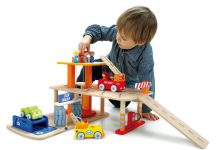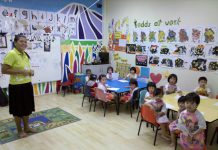Encourage Interest In Science Before It Becomes A Subject In School.
Zach devised a way to mount two tricycles together so that he and his buddy Etienne can ride together. Zach sat at the back and took a joy ride while he quipped to the front rider, “I don’t have to ride to move!” Now what would have pleased every science teacher in the scene is that Zack is just five. And by doing so what Zack has just demonstrated is his curiosity – a precursor to pursue the notorious subject called science.
Kids like Zach, on the average, start school at age three, but science, as a subject, is introduced to them in school at Primary 3. As a parent, you don’t have to wait that long to bring science into your child’s life. A simple playtime can pique young children’s interest in the subject.
Ms Quek Siao Yan, Principal of Joewe Playhouse and Educare Centre, agrees that science is not separated out as a subject but integrated into the play activities. “We do nature projects, cookery lessons and outdoor trips to science centre. Children are aware that they are learning science and these fun activities help them explore their world naturally.”
Young children by nature are curious and love exploring their world. Take advantage of their inherent sense of wonder to instil a love for science. The Carnegie Science Centre in US has launched a programme; “Let’s Explore” to teach parents how to spark interest in science in early childhood. The programme’s philosophy? Don’t try teaching science; focus on catching children’s attention
Children love to ask questions. Why is the sea blue? Why don’t babies have teeth? What do birds eat? These questions help them to do higher-order thinking and make connections to form the big picture. Encourage these questions, get comfortable with their natural curiosity and it’s always okay to say “I don’t know. Let’s find out together.” You don’t need all the answers; just facilitate their discovery process. Indeed there are many everyday opportunities where you can encourage them to observe, ask questions and explore.
Horticulture At Your Window
Plan a window garden with your child. Bean plants are fairly easy and very fun to plant. Give him a tiny clay pot. Get him to plant a few seeds in the pot, fill it with soil, and level the soil to settle around the seeds. (Use organic soil and avoid chemical fertilisers as much as possible). Teach him to care for the plant by watering daily and talking to them. Ask him to watch the plant grow and take photos and record its growth on a chart. Watch him beam with pride over his very own bean plant.
Meteorology At Breakfast
Become a weather watcher. Begin your day with a discussion of the weather. Is it a sunny day? How hot is the sun? How does the sun’s heat feel on our skin? How does rain feel? Why is rain important? Keep a daily log of weather, with different symbols for sun, clouds, rain, lightning and thunder. Talk to them about clouds, clouds movement, cloud formation, and how rain clouds look like.
Chemistry In The Kitchen
Your kitchen can be a home science lab for measuring and cooking concoctions. Use fun objects to mix colours and ingredients. Let your child name them, sort them and add them to the mixing bowl. Ask questions about smell, texture of eggs, onions and tomatoes. Cut a fruit lengthwise and across to let them see the difference.
Astronomy At Night
Explore the night skies together. Take your child to the window or out to the beach and star gaze. Look for the constellations. Point out the difference phases of the moon. Get a book on constellations and read about how each constellation got its name.
Physics In The Playground
Your child’s favourite playground is in fact a natural physics lab. The slide shows concepts of gravity, the swing illustrates the laws of motion and the seesaw relates to the principles of balance. Let them run on different rams and ask them which one requires more energy.
Botany In The Garden
Take your child to the park and collect leaves. Sort them by size, shape, leave pattern and colour. Expand their knowledge by talking about the origin of the leaf, why they are green and what happens when they dry up. Take them on a bug hunt. Discuss why some bugs are insects and others are not. Hone their observations skills through such activities, together with discussions and questions that make them think
These are just a few everyday science experiences. Just get playful and approach the world through your child’s eyes. And when you run out of ideas, just ask your child what he would like. Play marbles? – A great way to learn about mass and velocity.






































